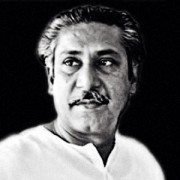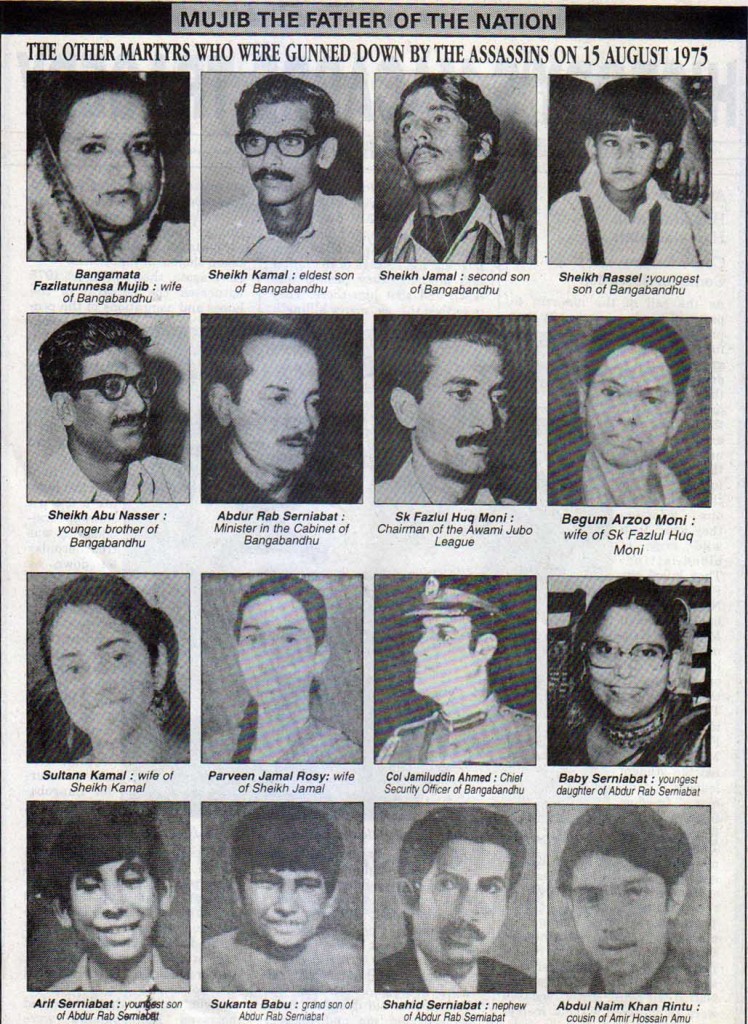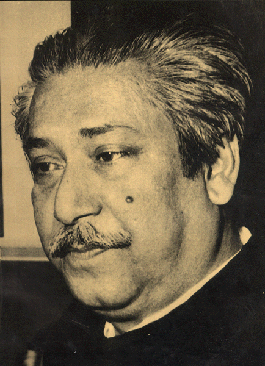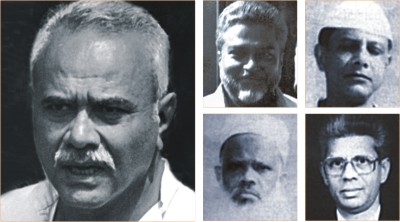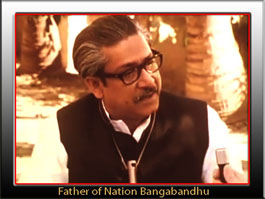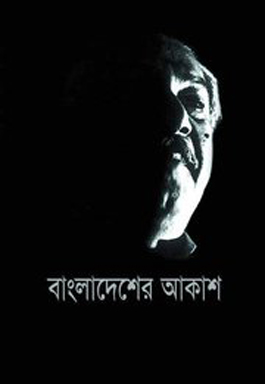HISTORY’S MACABRE TRAGEDY
Allah-hu—Akbar
Hya alal salah
Hya alal falah
Come for prayers’
Come for salvation
As the call of the muezzin to prayer floated across the city that pre-dawn fateful 15 August, a group of murderers, ignoring that call, were proceeding with their tanks and armory towards fulfilling their evil intent. With their murderous weapons they went on a wild orgy of blood-letting. They killed the Father of the Nation, Bangabandhu Sheikh Mujibur Rahman, who had lighted the path of freedom for this country. They killed my mother, Begum Fazilatunnessa Mujib. They killed the student leaders and brave freedom fighters Sheikh Kamal, Sheikh Jamal and their newly-wed brides Sultana Kamal and. Rosy Jamal, the brides who still bore the henna marks on their palms. There was a lot of killing that morning. The only brother of Bangabandhu, Sheikh Abu Naser, Brigadier Jamil, who had rushed to save the life of the Father of the Nation, the police and bodyguards were slaughtered without mercy-or reason. Little Russel, only ten years old, was crying with fright, “Take me to mother, take me to mother”. They dragged him to the dead body of his mother, and, pushing the corpses of his father and brothers; they pushed him down and shot him there. They described this as “mercy killing”! And this was not the only killing they did that night. The list goes on and on. Sheikh Fazlul Huq Moni, a prominent youth leader, and his pregnant wife were mercilessly killed. The killers went to the house of labor leader Abdul Rab Serniabat and murdered the entire household, including his thirteen-year old daughter Baby ten year old son and Russel’s playmate Aref, his four year old grandson Sukanto, his nephews Journalist Shahid Serniabat and Nantu. They did not spare the servants and others who had taken shelter in that house. Once again, that 15 August 1975 witnessed the betrayal of the hopes and aspirations of the people of this soil. Recall 1759, on the field of Plessey where that other grand betrayal enslaved the Bengali people for two c e n t u r i e s , when Bengal‘s last indep e n d e n t Nawab, Sirajuddowla, was treacherously let down by his own commander-in-chief.
Here in newly independent, war-torn Bangladesh, Khondokar Mostaque’s lust for power, to become the president of this country, led him to murder Bangabandhu with the collusion and collaboration of his trusted boys Col Rashid, Col Faruq, Major Dalim, Huda, Shahryar, Mohiuddin, Khairuzzaman, Mohsiu and others. And just as on that field of Plessey two hundred years ago, the soldiers of Sirajuddowla refused to defend him at the behest of that other traitor Mir Jafar, who hand lusted for power, to replace Sirajuddowla, among those who had betrayed Bangabandhu were some of his most trusted people. Some who had been molded by his own hands and had reached to the heights of power due to the reflected glory of Bangabandhu.
It is strange that history is full of repetition. But we never learn from history. For, just as Mir Jafar could not retain the better fruit of his treachery (he was Nawab for less than three months) our Mostaque was president of Bangladesh for not even three months! Traitors are not trusted wholly, even by their own evil masters. Such is history!
With the cruel death of Bangabandhu, the hopes and aspirations of the people of Bangladesh were once again trampled upon by corrupt, dishonest and unethical elements. Where he had stimulated a hope, euphoria that there was nothing that Bengalis could not do, a hopeless despair and the victims of exploitation, of slavery. The traitors had destroyed the euphoria generated by Bangabandhu and the heady victory of 16 December 1971. The fate of the killers of Bangabandhu was another bizarre phenomenon. Gen. Ziaur Rahman not only did not punish them, but by an amendment of the sacred constitution, they were exempted of their crimes and protected from any punishment. And, strange irony, they were rewarded for this act. They were inducted into the foreign ministry and sent out to represent Bangladesh as diplomats. And by this act all the ideals and fundamental values on which this country had fought for independence——tolerance, justice, equality of opportunity, secular-life to emancipate the Bengalis from bondage, economic social and cultural slavery? The key to this answer is just that key word ‘emancipation’. Bengalis were downtrodden and crushed. They were the second class citizens of Pakistan; they were not the masters of their fate. Decisions came from the military junta of Pakistan and East Pakistan was ruled by a few a puppet henchmen who carried out their master’s orders. Power was vested in the hands of a selected coterie. And Bangabandhu dared to challenge that vested interest group.
The hope he infused in the minds of the Bengali race, for years crushed under the bondage of exploitation, led them to a long and cruel battle and ultimate victory. That was his crime! Not very long ago Bengalis too had fought for the creation of Pakistan, and among them was Bangabandhu. But later the victory turned sour. We got nothing from that lesson, neither economic, nor political benefit. We were ruled with an iron hand from Pakistan. Our own wealth was used to build up Pakistan while our roads, schools and other institutions started to decay. The crunch came when Bengalis were told that they could not speak their own language and that Urdu would be the only language of this country. A lot of blood had to be shed before we retained the right to speak our own l a n g u a g e ! That was what we got for fighting for Pakistan.
Conspiracies continued to crush our culture and deprive Bengalis of their ancient heritage. Twenty two families were artificially created to control the economy of Bangladesh. All business was controlled by them. Bengalis never got an opportunity to explore and exploit their own resources. They were not encouraged to have any kind of business. For the smallest business deal we had to go to Islamabad, stay there at our own expense and try to meet the big personalities for the smallest favors. lf there was a Pakistani contender, the Bengali lost. Bangabandhu emancipated us from all these. His gift to the Bengalis was an opportunity to improve their lives in an atmosphere of freedom. Mark his famous speech of 7 March 1971 at the old Race Course. “This time our struggle is for our emancipation. This time our struggle is for independence. Joy Bangla.”
Predictably the reaction of the exploiters was panic! Food, as it were, was being snatched from their mouths. How could Bengalis dare and all the fault is of that Sheikh Mujib. He has roused the Bengalis! For Bangabandhu had indeed roused the Bengali people and made them dream dreams they had never dared to before.
They wanted to attain that golden Bengal, claim their legitimate rights to shake off the chains and shackles and live a decent life with the rest of the world. The vision of independence, of claiming their birthright led them to the glorious victory of December 16, 1971. After one of the bloodiest wars of modern times Bengalis achieved a historic victory: Their own country, their own flag. But on that sad morning of 15 August 1975, once again the defeated forces of 1971 raised their ugly heads. The ugly specter which had been crushed by our valiant forces rose up from the ashes to once again loot, plunder and enslave our people. A Bangladesh minus Bangabandhu was an easy praying the hands of that old coterie. What is Bangladesh today? Where does it stand? How much have we achieved since 1975?
The dream that Bangabandhu had for his people-food, clothing, shelter, education, medical facilities, opportunity for all–has any of this been achieved after his death? Through a lifetime devoted to freeing his people and giving them a life of dignity and honor, Bangabandhu had to face untold harassment. Jail and torture, constant harassment by the police. and intelligence was his lot, Simple-minded and uncompromising in his purpose; Bangabandhu never had his spirit broken, not even when he faced a possible death sentence during the trumped-up Agartala case days. His devotion to the cause of our people, his uncompromising idealism, should be a lesson for our younger generation. He achieved his victory. And what happened after Bangabandhu was killed’? That very military rule against which he fought all his life, against which three million lives were sacrificed and against which our valiant soldiers fought for nine months once again was clamped on Bangladesh. People lost their fundamental rights. An unrelenting campaign was launched to belittle the image of Bangabandhu. The freedom fighters were insulted, harassed and even jailed and tortured. An even more vicious campaign started to distort the true history of our liberation war.
Textbooks were changed overnight. The real war heroes, names were downplayed while those who had actively opposed the creation of Bangladesh were made into liberation fighters Night became day and vice versa! As a result, there was dormant resentment against the whole move. Powerless and beleaguered, Bengalis wore a mantle of depression and despair. The military totally controlled voting rights and food supply of the country. That is how the entire country went into their clutches. The rich became richer while the poor went down further. While some selected groups of people began to live a life of luxury beyond imagination, the bustees (slums) swelled with the homeless. Corruption crept into every sphere of life and slowly became institutionalized. Here are some statistics showing the conditions then and now. During Bangabandhu’s time the rate of literacy stood at 26%, now it stands at 16%. Previously the percentage of the landless was 37%, now it is 70%. Previously farmers owning 25 bighas or less land were exempted from taxes. Now our farmers are crushed under the heavy burden of taxes. Whereas before 22 families were artificially created to control the economy, now we have several hundred. During Bangabandhus time export rate was 7 times compared to the present 2 times. Foreign goods have flooded our markets. Domestic products are being flushed out. Smuggling has reached an all-time high. Bangabandhu had put a bar 0n gambling and alcohol. Nowadays nearly every home has a mini-bar, while the villages are being polluted with gambling and alcohol. Drugs are freely available to our youths, destroying valuable young lives.
Government-sponsored terrorists are overrunning the educational institutions, vitiating the atmosphere of the campuses. Crime is on the increase both in the cities and villages, making the lives of the defenseless common people unbearable. Law and order situation has gone beyond control and there is no effort to improve the situation. Unemployment is on the increase, educated youths are jobless, creating a tense situation in the country. The lion’s share of the budget is allocated for unproductive purposes while a meager sum trickles down for health and education. Inflation and price hike have driven the ordinary people to desperation. Malnutrition and infant blindness is a direct result of starving mothers. And for all this the blame lies squarely with the conspirators and killers of Bangabandhu, for the destroyers of the idealism on which Bangladesh was created. And for this we have to delve deep and unearth the real reason why Bangabandhu had to be murdered. Lt must be made public. The consequences of that gruesome and heinous crime are there for us to see. And again, to lift the population of this country, to lead them out of darkness and despair to the path of truth and idealism, we have to single out the criminals and give them exemplary punishment. On this 15 August, all Bengalis should take on oath to root out any kind of autocratic element from this country. Autocracy must go, and true democracy must be re-established. Rule of law must be imposed with the trial and punishment of the killers and traitors, the conspirators of 1975. That is the only way to save this unfortunate and hapless country. That is how we can re-establish our beloved golden Bengal.> 1988 .
Author : Honorable Prime Minister of Bangladesh Sheikh Hasina

